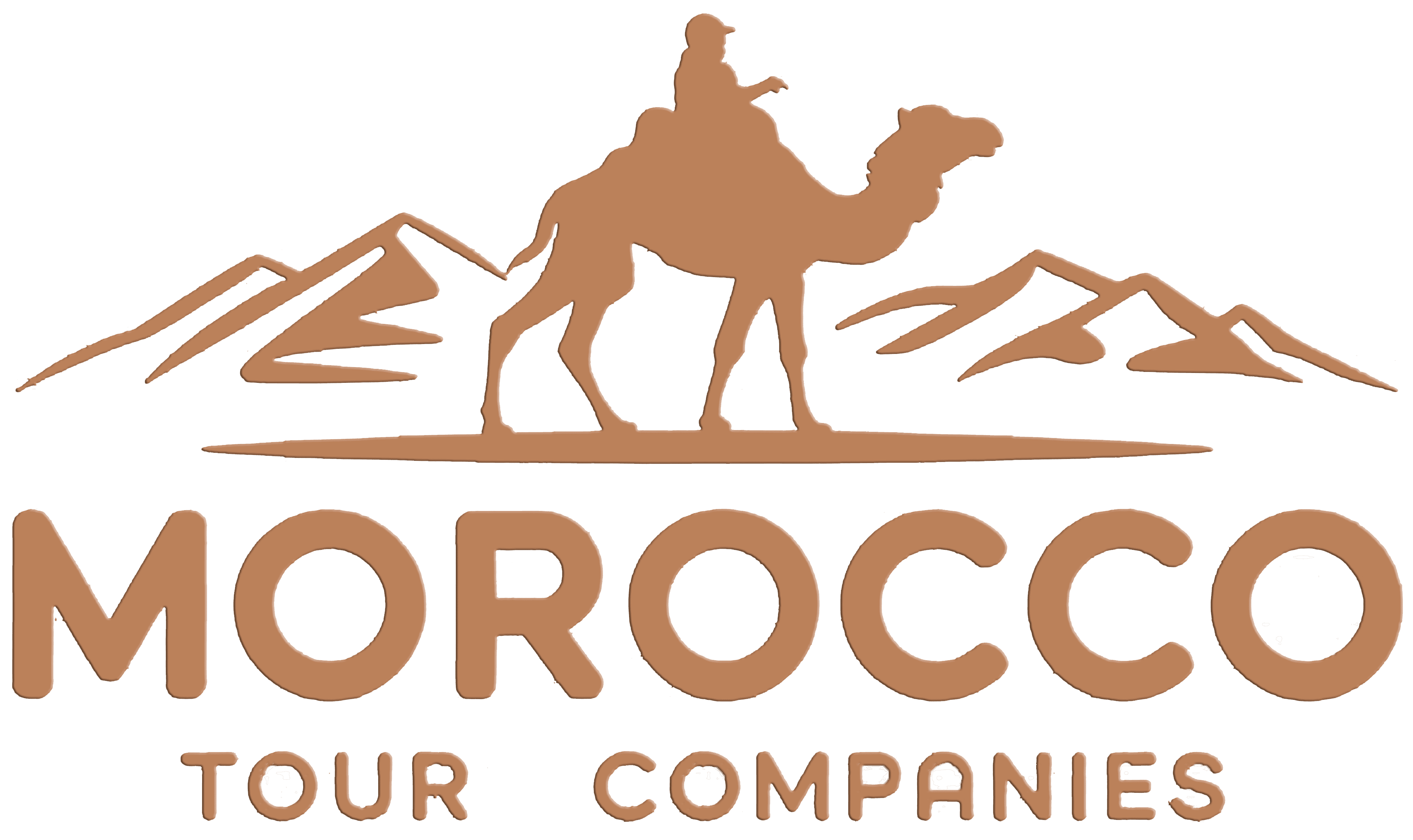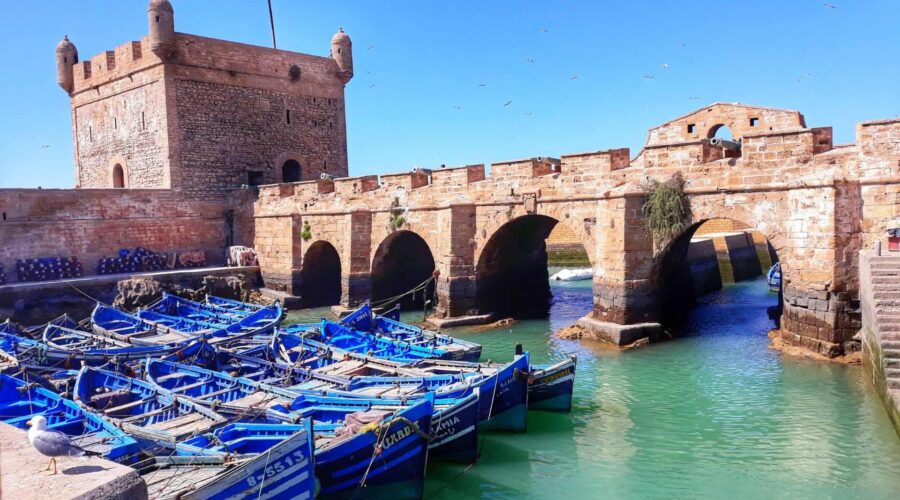Discover the cultural richness “15 days from to Imperial cities from Marrakech”. The four cities of the imperial circuit, including Marrakech, Fez, Meknes, and Rabat, showcase the country’s history and heritage. Visit iconic sites like Jemaa El Fna square, the Nejjarine fountain, Bab El Mansour, the mausoleum of Mohammed V, Volubilis, and the Hassan II Mosque in Casablanca, all recognized as UNESCO World Heritage sites.
Immerse yourself in the vibrant souls, bustling markets, and intricate alleyways of Marrakech and Fez, where you’ll be captivated by the sights, sounds, and aromas of the skilled artisans, orange blossoms, and colorful textiles. Experience the scenic beauty of the Atlas Mountains, adorned with charming villages, and explore the vast dunes of the Sahara Desert.
We will meet you at the airport to transfer you to the hotel.
departing to Essaouira, old Mogador and the city’s old Portuguese port, famous for its vaccinations. In Essaouira you will visit: Agran Forest, Argan Cooperative, fishing port, Sakala, Kasbah, Medina and souks. Afternoon walk on the beautiful beach.
head towards Safi, an important city in the ceramics industry. Visit the city and continue on the coastal road towards Oualidia and El Jadida, the old Portuguese city with its walls in front of the ocean. Tour the fortifications offering fantastic views of the city, port and sea and visit the Portuguese Cistern.
During the visit to Casablanca we will visit the main tourist attractions: Mohammed V Square, Arab League Park, stop in front of the Grand Mosque Hassan II (optional visit except on official holidays: 120 dirhams paid on site), walk to the edge of the Corniche where the restaurants follow each other. Hotels, shops and cafe terraces.
Departure to Rabat, the political and administrative capital, on the Atlantic coast. Rabat city tour includes: visit Al-Mishwar, entrance to the Royal Palace, Chellah (Marinid cemetery from the 13th century), Mausoleum of Muhammad V (white marble pavilion crowned with green tiles), Hassan Tower (12th century) and Kasbah of the Oudayas (the first royal residence) with Gardens in the Spanish Moorish style.
we will cross the highway to visit Tangier, the crossroads between Europe, Africa, the Atlantic Ocean and the Mediterranean. In Tangier, we will explore the old city, visit the ancient hilltop Kasbah which offers panoramic views of the Mediterranean, and visit Cape Spartel and the Hercules Caves.
After breakfast in Tangier, we will head to Chefchaouen, the pearl of the north of the country and one of the best destinations in Morocco. The Blue City, which was founded in the late fifteenth century, has become one of the best destinations for tourists from all over the world.
Once you reach the city, you will have fun for free. It’s time to explore the small city at your own pace, the Kasbah, Outa El Hammam Square and stroll through the blue streets of Medina. Dinner and overnight at the hotel or riad.
Departure to Meknes and visit the majestic Bob Mansour Gate, the Medina, the old stables, granaries and the Qur’anic school in Bou Inania. In the afternoon, head to Moulay Idriss, the small holy city, which houses the shrine of the very important national saint.
Finally, visit the ruins of Volubilis, the ancient Roman capital of the African region “Mauritania Tingitana”, famous for its well-preserved mosaics, and the remains of its oil presses and baths. In the evening, arrive in Fez.
The pearl of the Arab world, Fez is the spiritual, intellectual and cultural capital of Morocco. A day dedicated to visiting this prestigious city. In the morning, Fez el-Bali with the old medina and its souks, Zaouia Moulay Idriss, Medersa Bou Inania, Nejjarine Square with its beautiful fountain, the Nejjarine Museum of Arts and Crafts, and the Fassian crafts workshops.
Lunch then Fez El Jadid: Mellah, entrance to the Royal Palace, potters complex and tower walls; Panorama of the city from the Merinides Tombs (14th century). One night at the hotel or riad in Fez.
Azrou Road in the Cedar Forest; Where we will stop to meet the Barbary monkeys and the Zad Pass (2178 m) in the Middle Atlas, then depart for Midelt at the foot of Jebel Ayachi where we will stop for lunch at a local restaurant.
Then continue crossing the High Atlas with the Nzala Strait and the Ziz Strait towards Errachidia. Along the way you will appreciate the beauty and diversity of the landscape. Arriving in Merzouga, exchange the car for a camel for a new adventure and an overnight camp in the desert.
Wake up early to enjoy the sunrise over the sand dunes and join the village of Merzouga, then head to Rissani to visit the largest and oldest souks in Morocco. Then he continued towards Zagora, crossing Jebel Saghro, with its lunar landscape of plateaus, peaks, valleys, and the vastness of its area, to the stone villages of Tazarin and Nakob, built with mud bricks. Continue to Zagora, the last stop of the caravan before the desert, and discover the Tesserget Palace with its maze of alleys.
The Draa Valley, from Zagora to Ouarzazate, is a series of valleys and depressions with green islands formed by oases. After crossing the village of Agdz, you will visit the Kasbah of Tamnougalt, an ancient fortified palace surrounded by walls, a striking example of the traditional architecture of southern Morocco. Stop at Kasbah Taourirt, the former residence of the Pasha of Marrakesh. Overnight in Ouarzazate.
The Route of a Thousand Kasbahs extends from Skoura to the Dades Valley. It is dotted with clusters of fortified land with beautiful ocher colors. Head to the large palm grove of Skoura, where the residents of many of their villages live on agriculture.
Arrival to Kelaat M’Gouna, famous for its “Rose Festival” held in May. Crossing Dades towards Tinerhir before reaching the Todra Gorge, a huge rift 250 meters high with a river of clear water running at its bottom. Return to Boumalne de Dades and then Ouarzazate for another night.
After breakfast, we will head to Haddou Ben Palace, a fortified palace and a World Heritage Site where many international films were filmed (Gladiator, Lawrence of Arabia, My Mother, Throne Games, …).
Continuing to Marrakech via the High Atlas via Tizi N’Tichka (2260 meters above sea level) and arriving in Marrakech. The most important tourist destination, Marrakesh is the third largest city in Morocco and the second largest imperial city after Fez. Overnight at the chosen hotel or riad.
stop in front of the Koutoubia, the representative building of Almohad art, a visit to the Marrakech Museum (ceramics, pottery, jewelry), the Bahia Palace, a masterpiece of Moroccan architecture with its gardens and courtyards, the Saadian cemeteries that will dazzle you with the beauty of their decoration, and crossing the Jemaa el-Fna, which is one of the tourist attractions.
In the afternoon, visit the surroundings of the city: the Manara Garden planted with olive trees and tower walls, the Ben Youssef Madrasa, the jewel of Arab-Andalusian architecture, and the Majorelle Garden (a botanical garden by the French painter Majorelle Jacques).
including an art historian’s official guide, accommodation in selected 3 stars hotels and riads, and a standard desert camp in the Sahara
| Number of Travelers | 2 persons | 3 persons | 4 persons | 5 persons | 6 persons |
|---|---|---|---|---|---|
| Price per person | 2,600 € | 2,540 € | 2,390 € | 2,110 € | 1,920 € |
| Total Cost | 5200 € | 7620 € | 9560 € | 10550 € | 11520 € |
Arabic and Berber are the official languages, while French is widely spoken, especially in urban areas and tourist destinations. English is also spoken in tourist areas but to a lesser extent.
It’s advisable to drink bottled water, avoid consuming unpeeled fruits or raw vegetables from street vendors, and ensure up-to-date routine vaccinations. Consult with a healthcare professional regarding specific travel health recommendations.
The Moroccan Dirham (MAD) is the official currency. While credit cards are accepted in many hotels, restaurants, and shops, it’s advisable to carry cash, especially in more remote areas and markets where card acceptance may be limited.
Tipping is customary in Morocco, particularly in restaurants, hotels, and for tour guides and drivers. A tip of around 10% of the total bill is typically appreciated, though it’s always best to gauge based on the quality of service received.
Desert tours often include camel rides in the Sahara, overnight stays in desert camps, visits to traditional Berber villages, stops at iconic landmarks like Ait Benhaddou, and opportunities to witness stunning sunsets and sunrises amidst the dunes.
Imperial cities tours typically include visits to Marrakech, Fes, Rabat, and Meknes, each offering unique historical sites such as the Jardin Majorelle, the Medina of Fes, the Hassan Tower, and the Roman ruins of Volubilis.
+491781147700
Moroccotourcompanies@gmail.com

